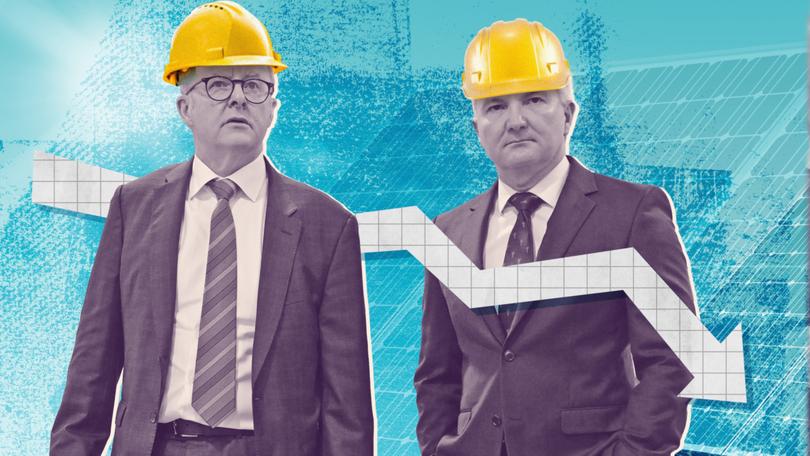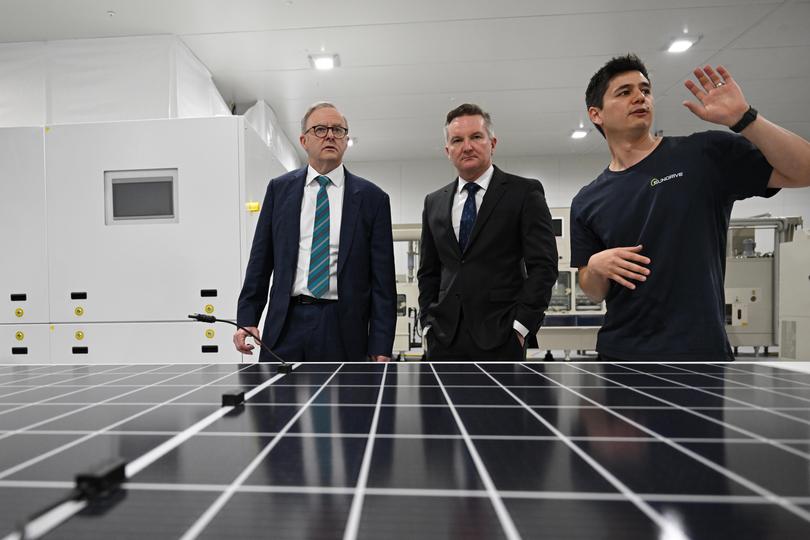ANDREW CARSWELL: Albanese’s solar manufacturing dream a pure fantasy
ANDREW CARSWELL: In the midst of a cost-of-living crisis, would you pay a considerable premium for Australian-made solar panels? Anthony Albanese is certain that you will.

In the midst of a cost-of-living crisis, would you pay a considerable premium to put Australian-made solar panels on your roof?
Anthony Albanese thinks you will.
In fact he is certain of it. Certain that you will dig deep into your own pockets to buy dinky-di Aussie solar panels, in some kind of nationalist duty to one’s country.
Sign up to The Nightly's newsletters.
Get the first look at the digital newspaper, curated daily stories and breaking headlines delivered to your inbox.
By continuing you agree to our Terms and Privacy Policy.The Prime Minister clearly thinks we are a noble bunch. But as much as Australians care about local manufacturing jobs, ever-tightening household budgets take precedence over fulfilling the PM’s dream of “a future made in Australia’’.
They absolutely would. If they could.
He also must think investors hate money.
In the midst of an economic downturn, with the political and social heat rising on renewable energy, would a business leader or investor pay a premium, and thus sacrifice their profit margin, just to buy Australian-made solar panels to populate its renewable energy project?
Anthony Albanese thinks they will. In fact, he’s willing to use $1 billion of subsidies to entice them.
Hold tight, there’s more.
In the midst of a clean energy transition, would you — after your $180,000 job driving trucks in a coal mine is made redundant — be willing to halve your wage and work in a factory making solar panels?
Anthony Albanese thinks you will. He’s even instructed his appointees at the Fair Work Commission to make that transition as seamless as possible. From fossil fuel to renewable energy … just minus $90,000 and a swag of extra entitlements.

This is the farcical, upside-down world of the Albanese Government’s made-in-Australia philosophy, one likely born of noble intent, but one that disregards the most basic economic and social realities.
After a sustained downward trend over decades, Australia’s manufacturing sector is under unprecedented assault, pounded by domestic policy pressures and encircled by nations who have significant cost, labour and location advantages, and vertically-integrated supply chains.
Manufacturing represented 25 per cent of the economy in the 1970s. It’s now less than 5 per cent, and falling.
This is a direct consequence of hyper globalisation, which has created a disconnect between our industrial cost base and our ambition.
The disconnect is echoed in Albanese’s own words, uttered outside the now shuttered Liddell Power Station last month, while announcing his $1 billion plan to convert the site into a solar panel manufacturing utopia.
“One in three Australian households have solar panels. We have the highest uptake in the world, but only 1 per cent of those are made here in Australia.”
Everywhere you look there is irony.
Because while no government is to blame for failing to stem the tide engulfing our manufacturers, some have opened the floodgates to compound the pain.
After spending 18 months burdening the manufacturing and minerals sectors with higher labour costs, higher energy costs, higher freight and transport costs and higher emissions costs, the Albanese Government suddenly wants to make manufacturing great again.
It suddenly wants our beleaguered manufacturers to be competitive with the rest of the world, having made them wholly uncompetitive through its raft of retrograde policy interventions, stretching from reckless industrial relations policy to idiocy on energy.
And if it can’t make our manufacturers competitive, it will pay for it to occur, through subsidies. But not even our subsidies are competitive.
The Investor Group on Climate Change admitted today that Australia faced a flight of capital from renewable projects because our renewables sector is risky, and there are more generous subsidies to chase overseas. Why would they bother here?
This institutional group only has, umm, $35 trillion in assets under management globally, $5 trillion in Australia alone. So while our global peers are spending hundreds of billions attracting this capital through incentives and subsidies, our PM puts $1 billion on the table.
Austin Powers. Pinky finger to the mouth.
Albanese’s aforementioned solar utopia in the Upper Hunter is the shining light of his Government’s upside-down made in Australia logic, based on the untested assumption that black coal miners will take up green power jobs and that locally made solar panels will be able to compete on price with cheaper Chinese imports.

That is no Sino slur. It is recognition that China has long had its minerals, processing and manufacturing arms in perfect vertical alignment: digging the copper, cobalt, lithium and nickel critical minerals out of the ground, refining and processing the materials at an onsite facility, manufacturing solar panels at an adjacent factory, and loading them up for export.
All done with cheap labour, with considerable government regulatory and subsidy support, and fuelled by affordable energy. And throw in a dose of likely human rights violations, given that more than one third of the world’s polysilicon (predominantly used in solar panels) is produced in the Xinjiang Uyghur Autonomous Region.
Perhaps it is no wonder China owns a near-monopoly 80 per cent market share in the global production of solar panels, ironically (that word again) produced with 77 per cent coal power generation, which Time Magazine recently acknowledged ensures that solar panels manufactured in China produce 30 per cent more greenhouse gas emissions than more expensive US made panels.
Competing on all those terms is nigh impossible.
Unless you are willing to pay for it.
Handsomely.
Andrew Carswell is a political strategist and former adviser to the Morrison government.
